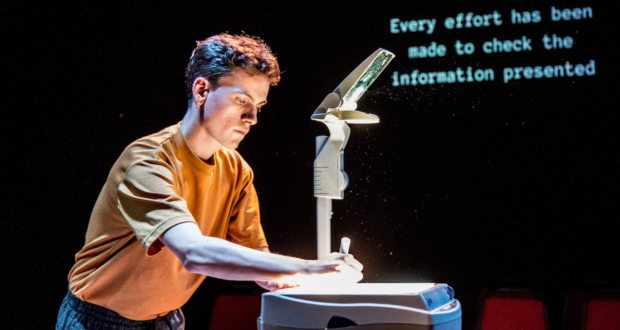This unusual piece of documentary theatre covers the past, present and future, with the theme of failure examined at its core. Summary
Rating
Excellent
Lessons on Revolution, currently playing at the Hope Theatre, is advertised as ‘documentary theatre’. Writers/performers Samuel Rees and Gabriele Uboldi guide the audience through the late 1960s, covering the LSE student protests, Nigerian Civil War, the Prague Spring and Martin Luther King Jr’s murder. The main focus, however, is the 1966-1969 LSE student protests against the appointment of Walter Adams as Director of the School. Adams had a prior presence in Rhodesia (now Zimbabwe) and was complicit in the white minority rule of the regime.
As both Rees and Uboldi explain the history, images and quotes are projected on two screens on either side of the audience. This helps consolidate the mass of information we are told, whilst reinforcing the ambiance of a lecture and highlighting the documentary theatre aspect.
We soon meet David Adelstein, President of the Students’ Union, and Marshall Bloom, President of the Graduate Students’ Association. Both are played by members of the audience. Before entering the Hope Theatre, you are asked whether you would be comfortable with reading out lines and wearing a basic costume. I’m not particularly fond of audience participation and usually when actors are looking for volunteers, I prefer to remain inconspicuous and avoid making eye contact with them at all costs. Yet, this consideration allowed me to relax and not feel worried about being randomly chosen.
The two women who volunteered to read lines did an excellent job of performing a particularly touching scene between Rees and Uboldi. Now in the year 2023, we find ourselves in their Camden flat, listening to a conversation between them discussing this play. They explore the concept of failure, ranging from struggling to write the Lessons on Revolution script, to their struggle to locate certain documents in the LSE archives, to the 1960s student protests not achieving their intended objectives and demands.
The various narrative strands and the different time periods in which the performanceis set blend seamlessly, prompting reflections on how history and the present day are interwoven. This interconnectivity is also reflected in the set. Designed by Ella Dale, it is reminiscent of a lecture hall but also a student flat. To the right of the stage is a shelf with a record player, kettle and stash of biscuits. Had I not just got a pint, I would have gladly accepted Rees’ offer of a cup of tea when I walked in to find my seat. In the centre of the stage is a table laden with documents, scripts and slides, dominated by a projector taking up most of the space. The mixture of modern and old-fashioned props in the production mirrors the historical and contemporary themes presented throughout.
In 1967, student activists occupied LSE buildings. To combat this, LSE management cut off the electricity supply, plunging them into darkness. Similarly, the audience here are suddenly plunged into darkness, heightening the impact of the moment. The lighting, designed by Laurel Marks, cleverly underscores the tension and drama of the scene.
Those LSE student protestors ultimately fell short of achieving their desired outcomes and demands. Yet, this piece of documentary theatre more widely explores failure in relation to how previous generations have dealt with the idea of radical change. Even bringing people together in a room, such as gathering at the Hope Theatre, marks the inception of an exchange of ideas and Rees and Uboldi’s work is certain to inspire.
Written by: Samuel Rees and Gabriele Uboldi
Lighting Design by: Laurel Marks
Set Design by: Ella Dale
Produced by: Carmen Collective and Undone Theatre
Lessons on Revolution plays at The Hope Theatre until 7 October. Further information and bookings can be found here.
 Everything Theatre Reviews, interviews and news for theatre lovers, London and beyond
Everything Theatre Reviews, interviews and news for theatre lovers, London and beyond



